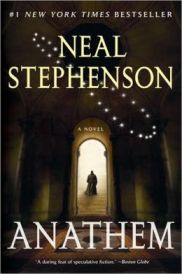 I am reading The Electric Church by Jeff Somers. I like the book. It is violent and there is a great deal of cursing (easy to please around here, aren’t we?). On Jeff Somers’ blog there is an interesting quote from an unhappy reader. Apparently this individual was none too pleased with the coarse language:
I am reading The Electric Church by Jeff Somers. I like the book. It is violent and there is a great deal of cursing (easy to please around here, aren’t we?). On Jeff Somers’ blog there is an interesting quote from an unhappy reader. Apparently this individual was none too pleased with the coarse language:
This was my first Jeff Somers book, and I will be avoiding any other books from the series. I would have rated this book 3 or 4 stars if not for the overuse of the F-Word. The F-ING writing style is F-ING like this: If you are F-ING fine with having to deal with the the F-ING F-Word, sometimes twice in the same F-ING sentence, then F-ING go for it. I’m not overly sensitive. I use the same word myself at dumb drivers, for example. My objection is the way it detracts from the narrative, like having a conversation with a person with limited vocabulary, throwing in F-bombs throughout their conversation.
What this unhappy reader doesn’t seem to realize is that it’s not Somers narrating his book. It’s his protagonist, Avery Cates. Avery Cates is a hit-man who came of age in a shattered society where most people don’t live to see thirty, where everything is burnt out and ruined and even if you manage to find some bathtub gin to dull the constant misery it’s liable to make you blind.
Consequently, Avery Cates says “fuck,” “shit,” “damn” and “hell” a lot. Avery Cates really isn’t concerned about offending anyone.
I have no problem with a character who drops a lot of f-bombs, provided it fits with the character.
Excessive cursing is a lot less obnoxious than other dialogue “quirks.” Phonetically rendered dialects, for example. This was an H.P. Lovecraft specialty. I would venture that no one in the history of published fiction has written more obnoxious dialogue than Howard Phillips Lovecraft. A character in The Dunwich Horror describes a monster thusly:
“Bigger’n a barn … all made o’ squirmin’ ropes … hull thing sort o’ shaped like a hen’s egg and bigger’n anything with dozens o’ legs like hogsheads that haff shut up when they step … nothin’ solid about it – all like jelly, an’ made o’ sep’rit wrigglin’ ropes pushed clost together … “
That’s right: “sep-rit,” “hull,” “haff” and “clost.” Someone wrote these words as dialogue and someone else paid to publish them.
I will take a boatload of fucks over that shit any day.




